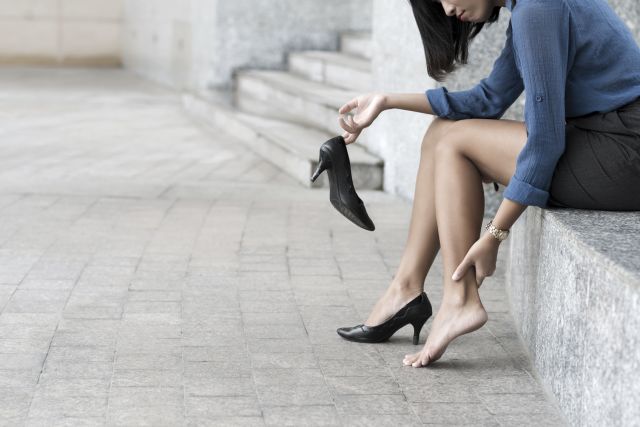High heels may turn your outfit up a notch, but they can wreak havoc on your body.
“Other than how they make you look, there’s very little upside to wearing heels,” says podiatrist Scott Hamilton, DPM, of Grand Strand Medical Center in Myrtle Beach, South Carolina.
Up to a third of women who wear heels have permanent damage because of prolonged use. Poor posture, shortening of the Achilles tendon and low back pain are other ways that heels can harm your body.
If you wear one or two-inch heels on a daily basis, you probably won’t experience serious health issues, says Dr. Hamilton. However, very high heels are another story. “Heels that are 4, 5 or 6 inches can definitely become a medical disadvantage,” he adds.
How long can you safely wear heels?
If you’re wearing super high heels all day every day, pain can develop after only a few days, but the more serious issues like a shortened Achilles tendon may take years. If you’re only wearing sky high heels for special occasions or very infrequently, you probably don’t have anything to worry about.
Short-term effects of wearing heels
Pain is the most common short-term effect of wearing high heels. “Heels take the relative weight off the back part of your foot, and thrust it to the front part, so most of the daily pain you experience is going to be foot pain and toe pain,” says Hamilton.
If you’re wearing tight or narrow shoes, you may develop bunions – bump deformities resulting from putting pressure on the big toe joint. Over time, the big toe leans towards the second toe and a bump will develop.
How heels impact your long-term health
One of the biggest issues Hamilton sees is also the most surprising to heel lovers – a shortening of the Achilles tendon. The shortening happens because the tendon has accommodated to the elevated heel, and that makes hard to get the heel back down to the ground.
“If you wear a high heel everyday, long-term, it's a given that you're going to develop a contracture or a shortening of the Achilles tendon,” says Hamilton. If your Achilles tendon shortens, even a flat shoe may be uncomfortable.
Lordosis, a curved spine, can also develop. “When you wear heels, you have to curve your lower vertebrae to maintain an upright posture, so it puts a definite strain on the lower back,” says Hamilton. Wearing high heels can also shorten your back and calf muscles, which may lead to more pain and muscle spasms.
5 easy ways to prevent damage
You don’t have to toss your beloved pair of pumps to stave off pain and foot damage. Here are 5 simple ways to keep your body happy while wearing heels.
Choose your heels wisely: If you have to wear high heels, be sure to choose a shoe with a heel that is two inches or less.
Watch the clock: Avoid wearing heels if you’re walking or standing a lot during the day, and try to refrain from wearing them unless you have to.
Stretch: Whether you have foot pain or back pain, working on your flexibility can reduce pain and lengthen out your body. Hamilton suggests regular yoga sessions to help extend your range of motion and improve balance. Stretch out your calf and feet muscles on a regular basis, too.
For a quick stretch: With your weight on the balls of your feet and your heels extended off the edge of a step, drop your heels down and then back up slowly. Repeat. You can also try putting a pen or pencil on the floor and picking it up with your toes.
Experiment with support: When wearing heels, Hamilton recommends gel cushions for the bottoms of your shoes so that when your weight thrusts down to the balls of your feet, it won’t be on hard platforms, but gel cushions instead. Arch support inserts aren’t very helpful, since you’re not putting the majority of your weight on your entire foot.
Check your size: With any shoe, you’ll want to make sure you’re wearing the right size. Your foot shouldn’t slide forward, and you should be able to wiggle your toes.
Follow the Worst Case Scenario series for answers to more health questions!






